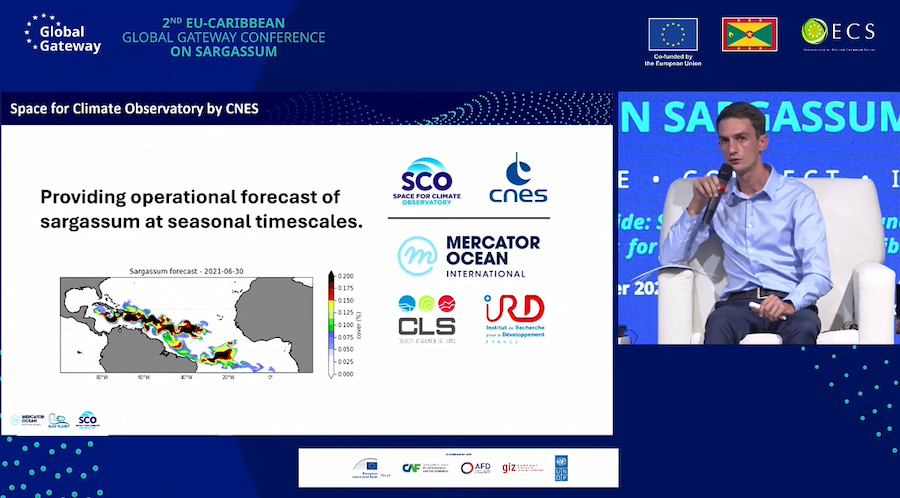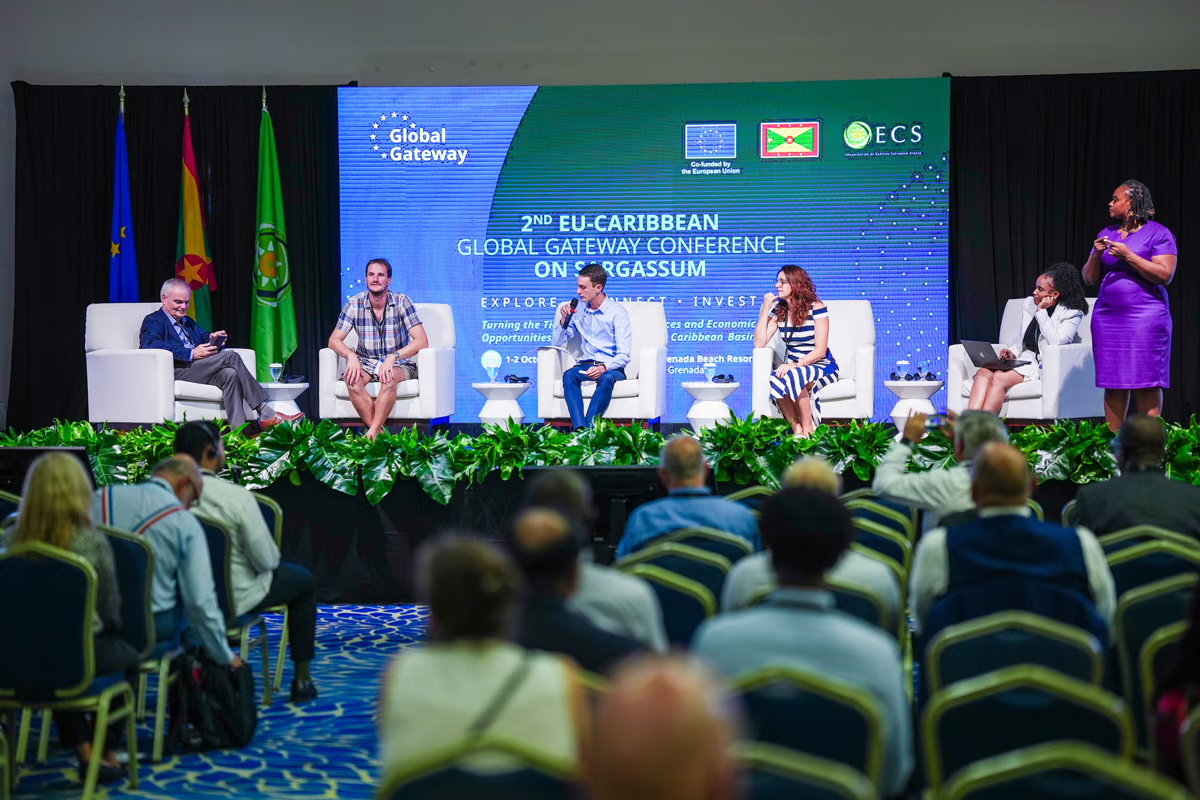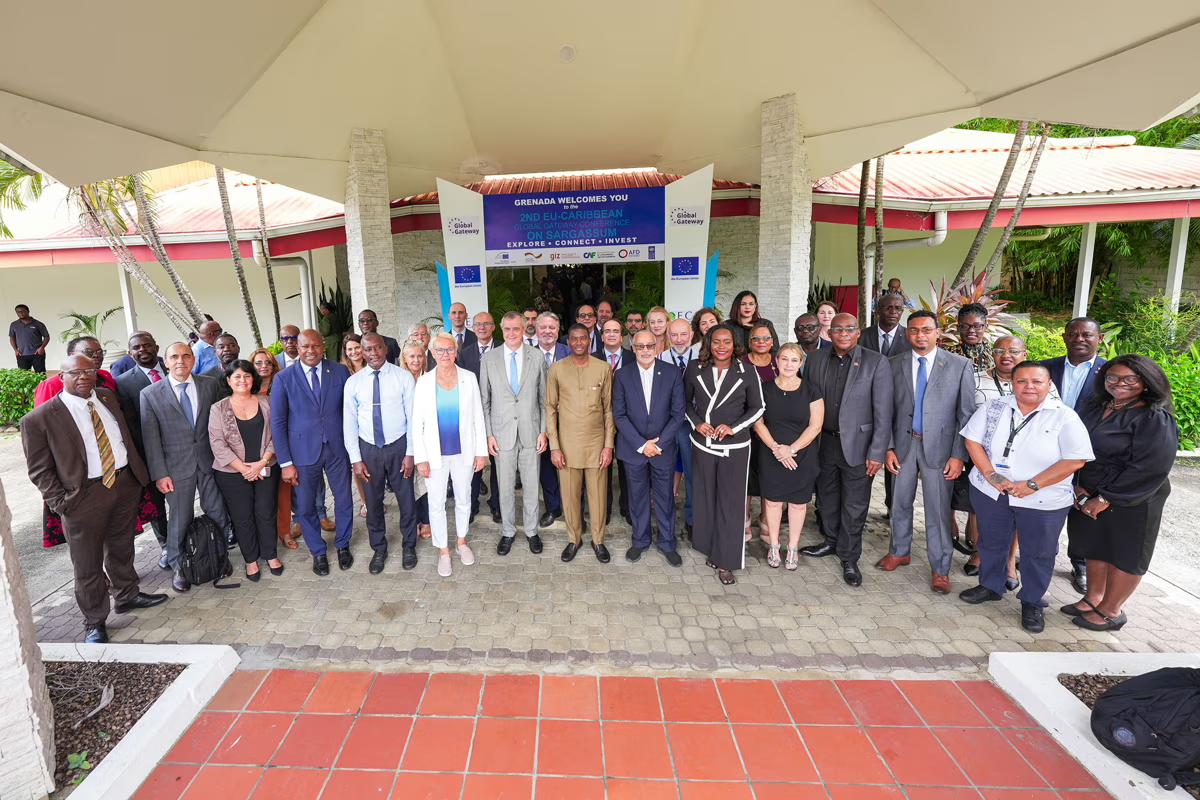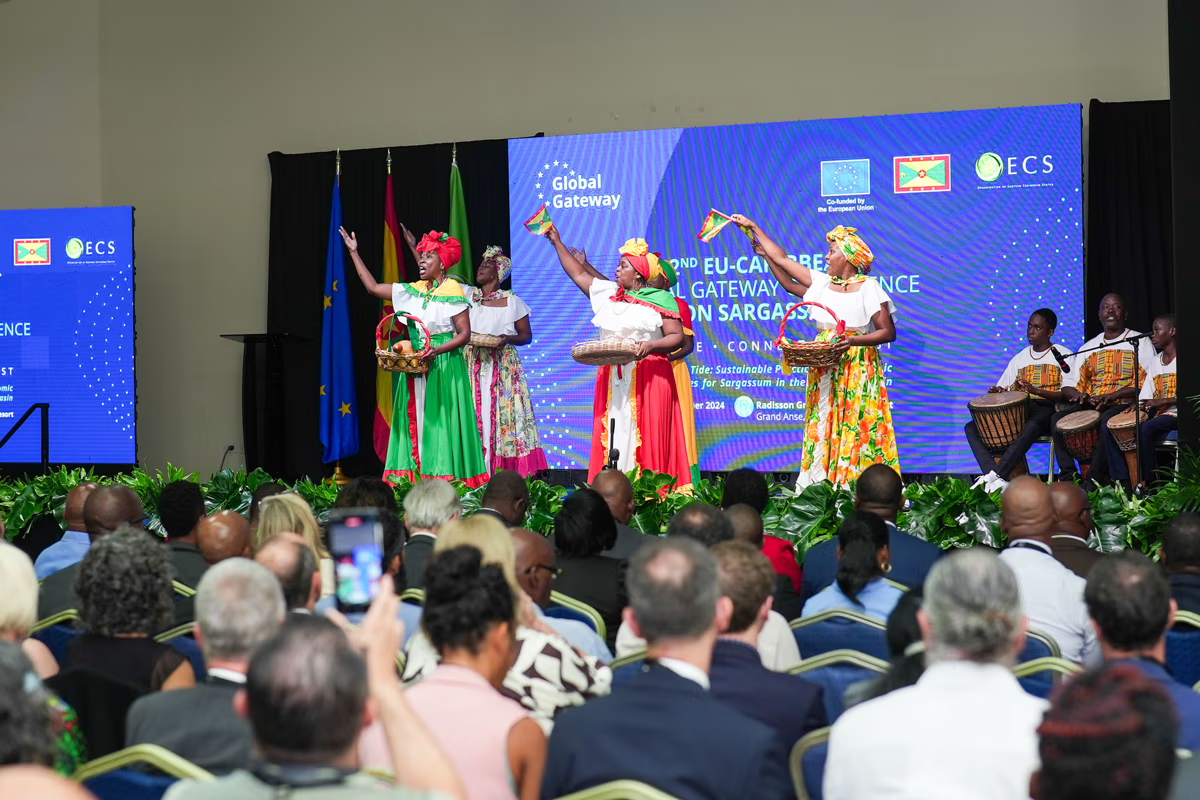Turning the Tide on Sargassum at the EU–Caribbean Global Gateway
Conference on Sargassum

In early October 2024, over 400 people from the Caribbean region and beyond gathered on the island of Grenada for the 2nd EU-Caribbean Global Gateway Conference on Sargassum. Organised by the Government of Grenada, the Organisation of Eastern Caribbean States (OECS), and the European Union (EU), the event explored solutions to the Sargassum seaweed crisis under the theme Turning the Tide: Sustainable Practices and Economic Opportunities for Sargassum in the Caribbean Basin.
The conference was co-chaired by the Prime Minister of Grenada, Hon. Dickon Mitchell, OECS Director Dr Didacus Jules, and Felix Fernandez-Shaw, Director for Latin America and the Caribbean at the European Commission. Together with the Hon. Kerryn James, Grenada’s Minister for Climate and Renewable Energy, and Malgorzata Wasilewska, Head of the EU Delegation Caribbean States, their keynote speeches emphasised the urgency of collective action to transform the Sargassum crisis into an economic opportunity. To meet this opportunity, they highlighted the importance of catalysing research and innovation in a common space, promoting public-private partnerships, and enhancing Sargassum supply forecasts.
A recurring theme during the conference was the perception of Sargassum. Attendees, including representatives from government, private sector, academia, financing institutions, donors and non-governmental organisations, discussed whether Sargassum should be considered waste, a resource, or part of the ecosystem. Practical matters were also discussed. For example, should Sargassum collection happen on shore, in coastal or international waters? What are the main challenges in the valorisation chain, such as transport and storage? Other critical questions focused on the evolution of the Sargassum season and how it varies over days, weeks, and months.

The critical role of ocean monitoring and forecasting
During the conference, Gaël Many, an oceanographer with Mercator Ocean International and a GEO Blue Planet Sargassum Working Group member, discussed how Mercator Ocean International supports Sargassum monitoring and forecasting.
The EU’s Copernicus Marine Service, implemented by Mercator Ocean International, provides free and open ocean data that is valuable for Sargassum management. On the forecasting front, there is ongoing work on seasonal Sargassum forecasting conducted through the Space for Climate Observatory (Connect-by-CNES) in collaboration with CLS (satellite observations) and IRD (numerical modelling). Many also emphasised Mercator’s leading role in the GEO Blue Planet initiative with funding through the EU4OceanObs project. An exemplary project from this group is the Sargassum Working Group, which supports the Caribbean region through the Sargassum Information Hub, a one-stop shop platform for all Sargassum monitoring and prediction information.
Alongside GEO Blue Planet, Mercator Ocean International is also contributing to initiatives like SargCOOP2, an EU Interreg programme, which aims to enhance Sargassum warning systems. Subject to securing the necessary funding, these efforts could be launched in 2025, providing actionable data to stakeholders such as fishermen, policymakers, and local communities. This would help transform the environmental challenges posed by Sargassum into opportunities for sustainable development.
Many also pointed out the technical challenges in converting satellite data into accurate mass estimates and improving nearshore predictions. To overcome these challenges, he highlighted the importance of collecting more in-situ data. This extra data would help provide reliable information on when and how much Sargassum will reach coastlines, fishing harbours, and protective dykes.

Moving forward
Alongside improving data collection, several other actions to create sustainable practices and economic opportunities in the region were discussed. For example, the Government of Grenada and the EU will assemble a project team in Grenada by the end of 2024 to mobilise resources and funds for offshore Sargassum collection, storage, and processing by 2026. The project team will include conference stakeholders and other interested parties.
Grenada also announced that it will host a regional Sargassum secretariat and information hub, positioning the country as the central hub for Sargassum-related activities in both the private and public sectors.
Meanwhile, conference attendees reaffirmed the importance of collecting Sargassum before it reaches the coastline. They pledged to mobilise investments for key infrastructure, scale up operations, and promote the transfer of cutting-edge technologies while minimising risk. These actions will help the development of sustainable Sargassum value chains.
The European Commission is continuing to work with GEO Blue Planet to further enhance the Sargassum Information Hub. Covering the Tropical Atlantic, the Hub provides information relating to Sargassum, monitoring, forecasting, mitigation, and business development opportunities, as well as events information. The Hub welcomes new contributions from organisations, projects, and experts.
Additional information
- Earth Observation value chain case study – Sargassum: https://www.eu4oceanobs.eu/wp-content/uploads/2022/12/Use_case_Sargassum_Dec2022.pdf
- Article: The Sargassum Information Hub: a collaborative approach to a common problem (GEO Blue Planet): https://geoblueplanet.org/the-Sargassum-information-hub/
- The Sargassum Information Hub: https://Sargassumhub.org/
- The GEO Blue Planet Sargassum Working Group: https://geoblueplanet.org/Sargassum/
- 2nd EU-Caribbean Global Gateway Conference on Sargassum Press Conference (youtube.com): https://www.youtube.com/watch?v=pCdAgQNlL2U
- Watch some of the 2nd EU-Caribbean Global Gateway Conference on Sargassum (youtube.com): https://www.youtube.com/live/1aUyOZ16kpA
- News coverage: EU–Caribbean Conference united action against Sargassum crisis – NOW Grenada: https://nowgrenada.com/2024/10/eu-caribbean-conference-united-action-against-Sargassum-crisis
- News coverage: Grenada to host regional Sargassum secretariat – NOW Grenada: https://nowgrenada.com/2024/10/grenada-to-host-regional-Sargassum-secretariat/
- Joint European Union and Organisation of Eastern Caribbean States press release: EU-Caribbean Conference Brings Together Stakeholders to Enable United Action Against the Sargassum Crisis: https://pressroom.oecs.int/eu-caribbean-conference-brings-together-stakeholders-to-enable-united-action-against-the-Sargassum-crisis
- News coverage: Ambition to Collect Sargassum Renewed at Global Gateway Conference – The Voice St. Lucia News: https://thevoiceslu.com/2024/10/ambition-to-collect-Sargassum-renewed-at-global-gateway-conference/
- News coverage: The EU-Caribbean Conference unites various parties to facilitate addressing the Sargassum crisis – Dominica News Online: https://dominicanewsonline.com/news/homepage/homepage-carousel/the-eu-caribbean-conference-unites-various-parties-to-facilitate-addressing-the-Sargassum-crisis/
- News coverage: Grenada Conference Explores Sargassum Economic Opportunities – St. Lucia Times: https://stluciatimes.com/166345/2024/10/grenada-conference-explores-Sargassum-economic-opportunities/





